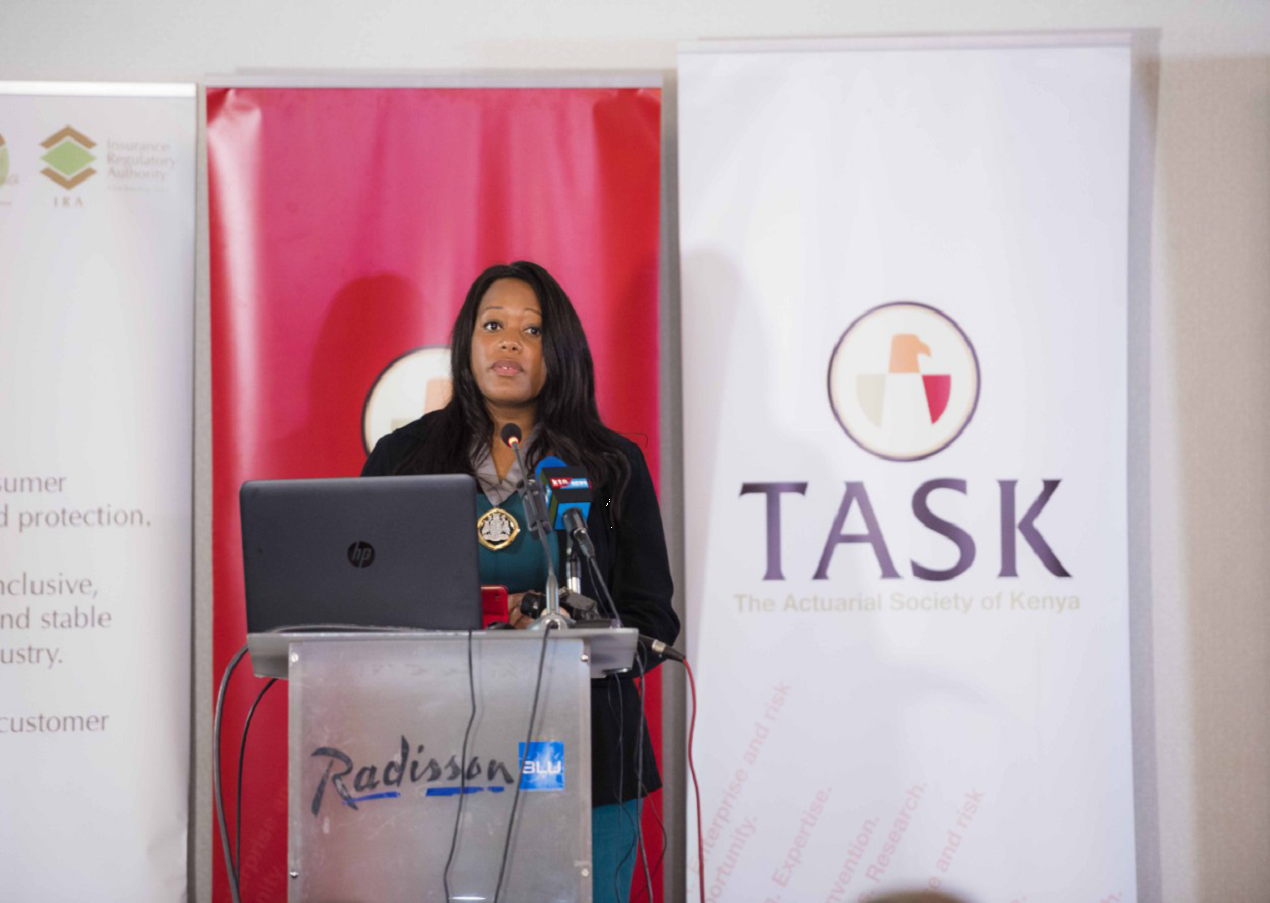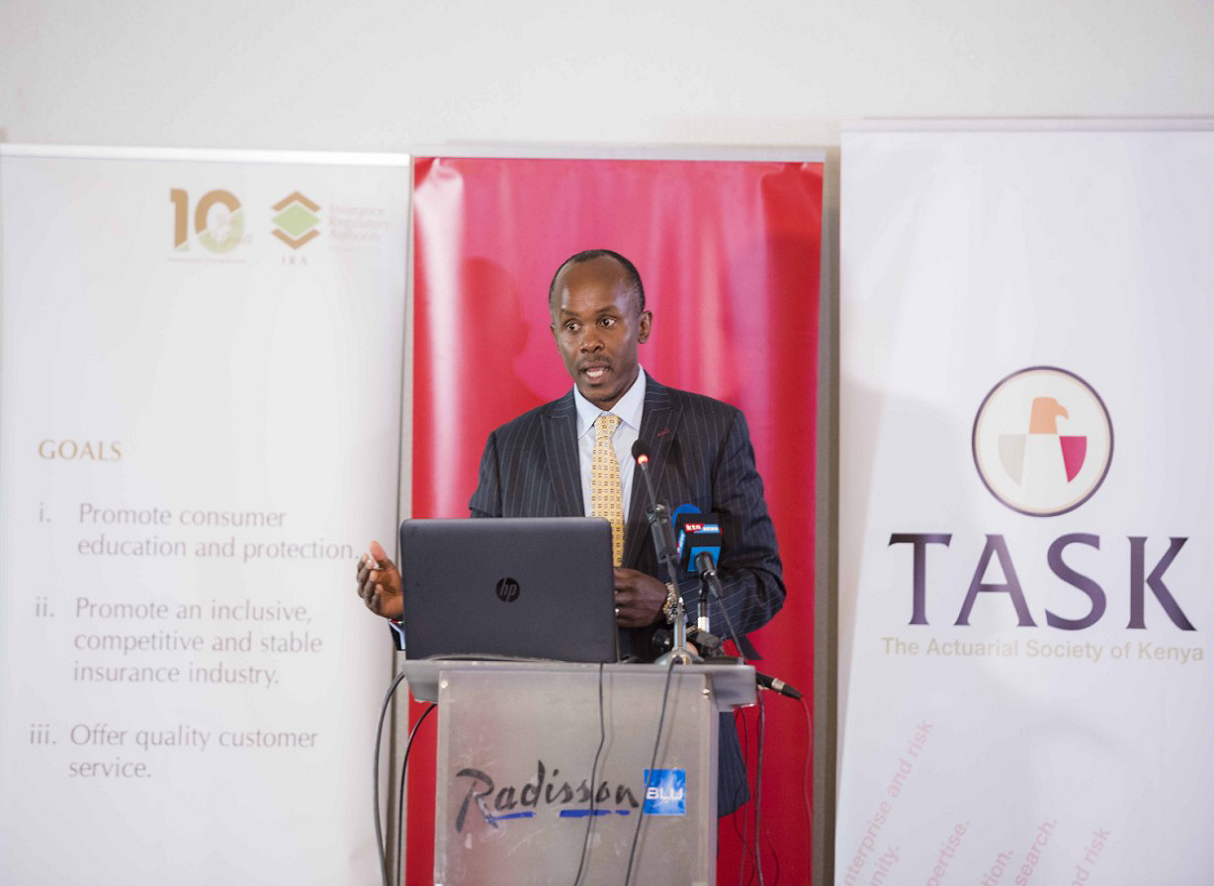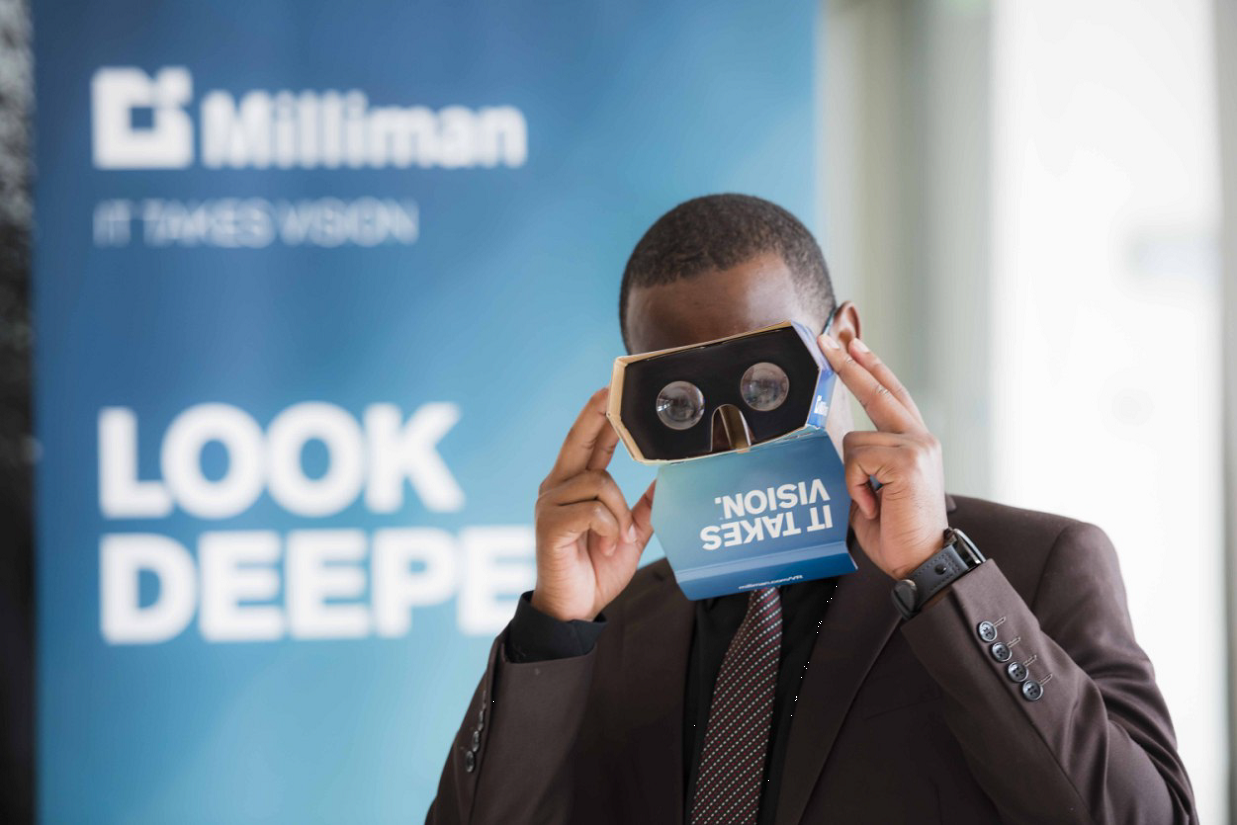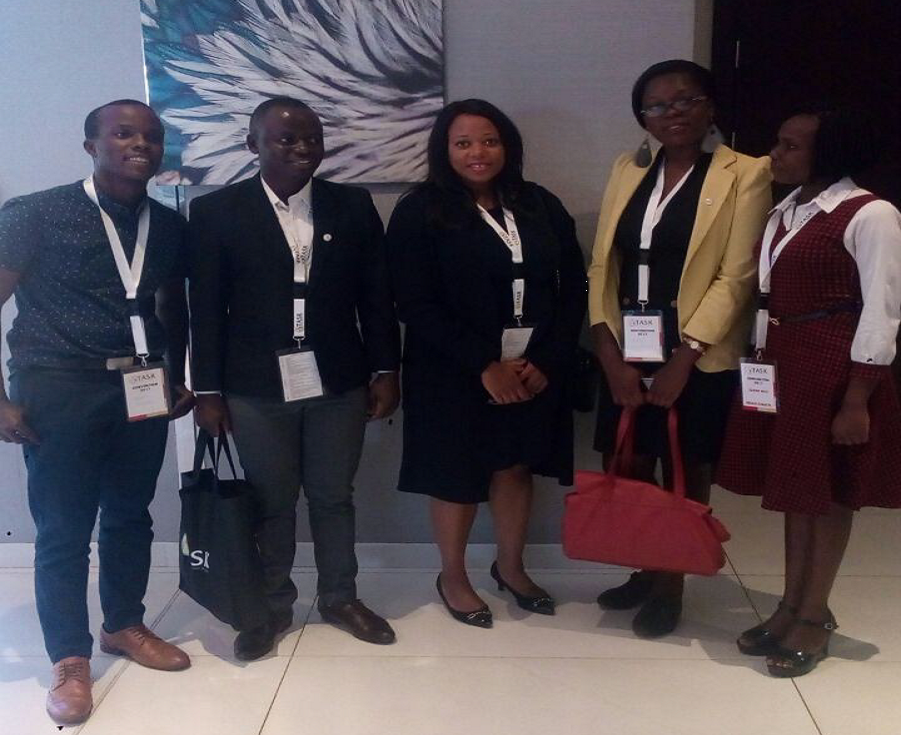The Actuarial Society of Kenya (TASK) held their annual convention on 15th-16th Nov 2017 at Radisson Blu hotel, Nairobi.
I got the chance to attend and the experience was inspiring and enlightening to say the least. Being from Meru University the only interaction I had with an actuary was at the 2017 Product design competition where I got to say Hi to Elias Omondi the Quant Ac-tuary, but the convention was different I got the chance to interact with Mr. Eze-kiel Macharia FIA, Mr. Moses Mutuli FIA, Miss. Mukami Njeru CERA, Mr. Dennis Mworia, Mr. Sundeep Ranchura FIA, Mr. Justine Otieno FIA , Miss. Emma Okere the data Scientist, Mr. James Norman from KPMG, Clive from Milliman, Mr. Linus Makhlulo from Zamara and I got to shake the hand of IFoA’s President Marjorie Ngwenya.
“….until the lion has its own story teller, the hunter will always have the better part of the story”
The event was extremely interesting, here are my personal favourite high-lights and I hope this article will inspire you to attend this year’s convention. The convention was emceed by Abby Ogina the KTN news anchor, he introduced TASK president James Olubayi FIA. In his address he pointed out the growth of TASK and the efforts its making in various fronts. At the end of his address he introduced IFoA’s president Marjorie Ngwenya FIA. Her speech was about the future of the actuarial career. She started by stating that as the human race we are on the blink of the 4th industrial revolution. She gave four main point that actuaries should do to remain relevant in the future. In her calming voice she said that, “as actuaries we need to focus on communication, we must be clear about the value we can add to business and to society.”

She quoted a Zimbabwean proverb that states: until the lion has its own story teller, the hunter will always have the better part of the story. As the actuaries of the future, “we have to broaden the areas we work, we must have the confidence to branch out into new sectors and open minded about how and where we can apply our skills. We must also take up new ways of doing things in the traditional areas e.g. taking up digital insurance. We must collaborate both more and more effectively both within and beyond our profession. If the actuary of yester years was primarily a mathematician the actuary of today is primarily a communicator of the outcomes of the mathematical puzzles, the actuary of tomorrow will be a skilled and highly valued consultant guiding clients and the society they live in.” James Mworia the CEO from Centum gave a talk about how economic development contribute in development of democracy. He quoted from a study which studied the relationship between democracy, self-expression and survival. In his remarks he inferred that future democracy relies on present economic development. He expressed his belief that to protect and ensure sustained society growth we must develop the economy. According to him we must trans-form our country from an agricultural economy to and industrial economy where everyone can participate. He stated that currently we have very few land owners who badly employ land. He also stated that we need better planned cities and that is only possible if we develop the real estate sector. He challenged us as professionals that if we don’t take our society to a higher level we would have failed. The role actuaries are to play in economic development are, providing leadership, accurately pricing risk, becoming risk managers, being communicators and provide old and current models for capital allocation. In current time we have access to capital and investments but we lack the leadership, as actuaries we were challenged to offer leadership not just in the technical aspect but also leadership that preaches new ideas and new innovations.

Mr . Mworia reminded us we need leaders who capable, credible and optimistic about the future. He stated that actuaries need to develop the following real world skills, positivity, opportunity spotting, problem solving, communication, ability to learn every day, commitment and integrity. He further encouraged us to commit to this by issuing a quote “uncommitted life is not worth living as it achieves nothing.” Another highlight was James Norman talk on disruption in the insurance business. He dared us to stand up if we were optimist about the future of our profession else we would be dubbed as ‘slay kings or slay queens.’ He started by stating there will be more change in the insurance in the next 3 yrs than the last 100yrs. He attributed the following factors as the causes of disruption;
- Regulatory focus shift from prudence to conduct.
- 4th industrial revolution and IOT.
- Sector convergence.
- New risk landscapes.
- Insure-tech.
- Automation, robotics, Next gen customers, New socio-economic dynamics.
- Rise of emerging markets.
He emphasized that we need to talk about disruption now. As actuaries, what is our role and how will we respond to change in the sector. “You have no choice but to use automation and data to drive insights. In large organizations that operate across multiple locations serving different customers, you have to rely on data to make better decisions. There is no other way. With so many different variables, you cannot rely on your gut instinct anymore.” He made it clear that automation is not about losing our jobs but re-inventing our role to be efficient and stay relevant. In his presentation he pointed out the following as the advantages actuaries are to gain from automation:
Business flexibility
– Reports can be developed in hours rather than weeks, so key decision makers can use insights to spot trends and respond in real time and business performance and efficiency can be tracked to uncover improvement opportunities in actuarial as a faster, optimal, value adding function. Elimination of traditional challenges.
Cognitive automation drivers:
Leveraged professionals — lower-qualified professionals who, through technology, can provide the same out-put as a fully qualified professional in the same field.
Connected workers

— providing all workers in a specific group or business function with access to all of the same materials so that everyone has access to the best information available.
Other advantages of automating actuary functions will include:
- More contribution to risk upside and strategic decisions .
- Wider ERM involvement.
- Working across the business with more confidence.
A key transformational feature is that automation and digital labour in actuarial functions will drive a more mature, high performing risk culture and deliver operational efficiency. He concluded by saying, “Over the coming years, we expect the perceived loss of transparency towards the increasingly complex systems to be replaced by the confidence that can be gained through rapid feedback created by auto-mated structures. With continuous feedback of results, acceptance and adoption of automation will quickly start to rise. Only those forward-thinking insurers that truly embrace the potential of actuarial automation/analytics, big data and leverage their potential throughout their organizations will find success in the data-driven future. With continued disruption it is an essential strategic and operational investment.” I also got the chance to sit in the talk about why insurance companies struggle to offer micro-insurance by Franciscah Nzanga a micro-insurance expert. She defined micro-insurance as protection given to the emerging market against risks such as fires, flood, hospitalisation and so on in exchange for a premium payment. According to her people in emerging markets have the following characteristics:
- Earning between Ksh 100 – 500 a day.
- Irregular income.
- Low literacy levels.
- Live in rural to high risk areas.
Often don’t have all legal documentation such as marriage certificates, birth certificates etc. She identified the following mistakes in designing micro insurance products:
- One shoe fits all mentality
- “All I have to do is reduce the premiums”
- Over/under pricing of products e.g. micro-health
- Complicated wording e.g. in the policy document.
- Complicated operational processes.
- Unrealistic claim requirements e.g. marriage certificates.
In the designing micro-insurance prod-ucts she suggested the following steps:
- Understand the market, that is con-duct market research: Find out in-come flow, Family size. Risks faced, willingness to pay.
- Tailor make a product through: Flexible payment schedules, Meet-ing actual risks faced e.g. market fires, Affordable premiums, Practical claim requirements, Simple contract wording, where possible in the local language.
- Test your product, either through: Focus groups – match the demo-graphic of the target market, Piloting e.g. for 6 – 12 months.
- Do not be afraid to embrace technology. For example
- Use of USSD platforms for enrolment.
- Use of Mobile Money for claim payment.
- Use of WhatsApp for document sub-mission.
On the second day just before the dinner we were treated to an electrifying performance by actuarial professionals from PWC. Their renditions of Papa Wemba’s ‘rail on’ and John legend’s ‘All of Me’ was out of this galaxy and got a standing ovation at the end of their performance. It is obvious for the students who attended these were not the only amazing talks and presentations that happened. I chose my favourites because the whole experience can’t be put in words. Hopefully this inspires students from all universities to participate in TASK and ASSK activities, the benefits are huge and eye opening. I can’t wait to attend this year’s convention. Shout out to Kelvin Lanya (ASSK Sec Gen) for pushing me to attend the amazing event. I end by quoting Mr. Sun-deep words at the ASSK dinner 2017, “Life begins at the end of your comfort zone.”

